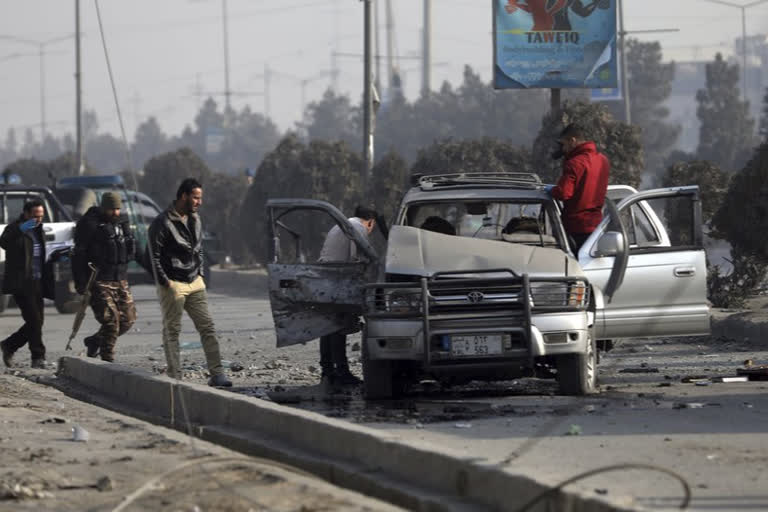Kabul: Separate explosions, set off by sticky bombs attached to cars, killed at least two people in the Afghan capital on Tuesday, including a prominent cleric who headed an Islamist nonprofit organization, officials said.
Afghan officials: Bombings in Kabul kill 2, including cleric Afghan President Ashraf Ghani denounced the cleric’s death as a "terrorist attack on the dignity and bright future of Afghanistan.” No one immediately claimed responsibility for the Kabul attacks, which also wounded five people.
The first bomb was attached to a military vehicle in central Kabul and wounded two military personnel, said Ferdaws Faramarz, spokesman for the Kabul police chief.
An hour later, the second bomb, in the northern part of the city, killed two people, including cleric Mohammad Atef, and wounded two others. A third sticky bomb wounded one person in western Kabul. Faramarz said police are investigating.
Ghani, in a statement released by the Presidential Palace, also said that Atef’s killing was the latest in a series of targeted crimes and assassinations. Atef headed the central council of Jamiat-e-Eslah of Afghanistan, an Islamist nonprofit organization based.
Abdullah Abdullah, the chairman of the country’s High Council for National Reconciliation, also condemned Atef’s killing. “Atef was a supporter of peace and reconciliation in the country,” he said in a statement. “But unfortunately, the enemies of the Afghan people took him away from us.”
Read:|Four killed in Kabul blasts aimed at police
In recent months, the Islamic State group has claimed responsibility for multiple attacks in Kabul, including on schools and educational institutions that killed 50 people, most of them students. IS has also claimed responsibility for rocket attacks in December that targeted the key U.S. base in Afghanistan. There were no casualties in those attacks.
On Monday, a report by a U.S. government watchdog — the Special Inspector General for Afghanistan Reconstruction, known as SIGAR — said that Taliban attacks in the Afghan capital of Kabul are also on the rise, with increasing targeted killings of government officials, civil society leaders and journalists.
SIGAR, which monitors the billions of dollars the U.S. spends in the war-ravaged country, said that the proportion of casualties caused by improvised explosive devices increased by nearly 17% in the last quarter of 2020, correlating with an increase in attacks by magnetically attached bombs, or “sticky bombs.”
Afghanistan has also seen a wave of attacks in recent months of attacks against journalists, human rights activists and civil society members in so-called targeted killings.
A prayer leader, Mullah Azizullah Mofleh Frotan, was among four killed inside a mosque when a bomb exploded during Friday prayers in western Kabul last June. Earlier that same month, IS planted explosives at a mosque in Kabul’s posh Wazir Akbar Khan neighbourhood, killing the prayer leader there and wounding eight others.
Separately, the Afghan defence ministry said Tuesday that army troops killed at least 48 Taliban fighters the previous day in operations in the country’s southern, northern and western provinces. The statement said 25 insurgents were killed when ground and air forces targeted the Taliban in Dand and Arghandab districts of the southern province of Kandahar, a Taliban heartland.
In northern Kunduz province, 12 Taliban were killed during a gun battle in Imam Sahib district, the ministry said, while 11 other insurgents died in fighting in Pusht Rod district in western Farah province. The Taliban did not immediately comment on the ministry’s report.
The violence comes as Taliban representatives and the Afghan government last month resumed peace talks in Qatar, the Gulf Arab state where the insurgents maintain an office. The stop-and-go talks are aimed at ending decades of conflict but frustration and fear have grown over the recent spike in violence, and both sides blame one another.
AP
Read:|Taliban attacks increased in Afghan capital: US watchdog
